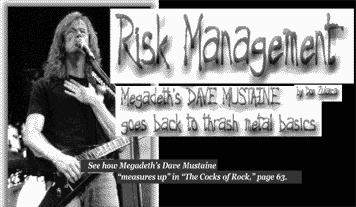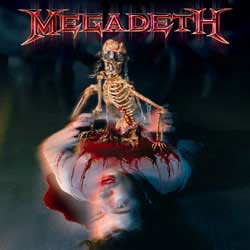|
|
| xmag.com
: September 2001: Risk Management |
|

Saying
Megadeth has endured some bad hands at the card table
is like saying during the '70s Steven Tyler and Joe Perry
liked the way cocaine smelled. Dave Mustaine and David
Ellefson's own tales of excess are legendary, making one
wonder how they were able to write and perform the meticulous
arrangements from albums like Rust In Peace (1990),
Countdown To Extinction (1992), or Youthanasia
(1994). Mustaine and Ellefson are back, rolling through
a fall US tour--and hitting the Roseland Theatre on September
9th--with guitarist Al Pirelli and drummer Jimmy DeGrasso
to support the recently released The World Needs a
Hero (Sanctuary). Hero is their ninth full-length
album since their 1985 debut, Killing Is My Business...And
Business Is Good,
and the first studio effort since 1999's critically panned
Risk.
"I
knew that Risk was taking a risk and we were going
to encounter some rough water and I'm cool with that,"
Mustaine confesses. "I'm not a masochist. I didn't do
that to bring on any repercussions. It was a daunting
task. It was exciting for us to think we could probably
get played on alternative radio like Metallica, Soundgarden,
Tool and stuff like that because these bands have elements
of metal and punk in them. The problem
is: With the name Megadeth, you can't
do that."
Regardless
of the repercussions, the group has gone back to its thrash-metal
roots with Hero, and Mustaine spoke with Exotic
about it from his home in Scottsdale, Arizona, before
hitting the road.
Exotic:
How conscious were you of getting back 
to
basics after what happened with Risk?
Mustaine:
Well, it's kind of like in the movies--you know, when
Forrest Gump broke free of the braces and started running
full-bore. People were trying to assist us and do the
right thing, and I have no regrets for what we did with
Risk or Cryptic Writings. I really think
we could have done a hell of a lot worse. The thing is
that Bud Prager was a legendary manager, and he wanted
to try to get us to break through to the alternative marketplace
and to some of the other different rock formats. My previous
band did it, Soundgarden did it, Tool did it. These are
all bands that are both popular at metal and alternative
radio.
And
using that as the yardstick, we thought we could play
that kind of music just as well as they can. Can they
play our kind of music? They're in our marketplace, we
can easily play music to get into their marketplace...but
the name really, really, really hindered our progress.
Alternative markets and alternative PDs and stations,
they liked some of the songs on the record but they just
didn't hang with the name Megadeth.
I
think it's a great record. It just should not have had
the name Megadeth on it, because if anybody else's name
was on Risk it would have sold, I think, really
well. Not only did we hurt the record by putting our name
on it, the record hurt our name. People were used to Megadeth
being really heavy. And you know, there are certain things
that you look back in hindsight and say, "God I would
have done this or that different." Yeah, I would have
done a lot of stuff different with Risk. I probably
would have made it a little bit faster. I probably wouldn't
have worried so much about what Marty Friedman was saying,
if I'd known he was planning on leaving. But it's one
of those things where, when you're stuck in the middle
of it, you don't really see what's going on.
Exotic:
How bad was the Risk backlash from hardcore  fans
and writers in the metal arena? I've read some stuff that's
pretty brutal. fans
and writers in the metal arena? I've read some stuff that's
pretty brutal.
Mustaine:
But that's okay. They're entitled to their opinions. If
their opinion doesn't matter, then neither does mine.
I support them in trying to get mileage with their following
by bashing us, because God knows that...what do critics
do? They critique. Controversy has surrounded me since
the very beginning.
[With Risk] I think a lot of [the critics] needed
to save their credibility with their following. And
by saying that they recognize the record as being a
great piece of music but then it had the wrong band
name on it, would have probably been a little bit perplexing
for some of the people who read their magazines or go
to their web sites. Some of these people, yeah, they
were bitter. It's like coming home, and the person you've
been living with for
so many years tells you that they're leaving. And you're
kind of like, "What?" And the problem was, we didn't
give them any warning. In their eyes, a lot of people
felt we had abandoned them.
And
a lot of people who spent all that time venting and
being hostile and going around slagging us, a lot of
those people are the ones who are evangelizing this
new record. So it's kind of like, what goes around,
comes around. And I know a lot of the people who were
shit-talking us. I'm not keeping score...So when they
come up and say, "Oh, I love the new record," I'm not
going to go, "Yeah, you prick." It's like Wendy O. Williams
said, "A pig is a pig and that's that." There are some
people who just will always be pigs.
Exotic:
That is so true. Even though I understand that slagging
sells more magazines than actual thought, some bands
are shit, but some so-called journalists are deservedly
in the same pile.
"It's like
Wendy O. Williams said,
'A pig is
a pig and that's that.'"
Mustaine:
And if you consider that a little over four centuries
ago, there was no thesaurus or encyclopedia or dictionary,
and most people had to just kind of go along with the
folklore of the wordsmith. Half of the people who write
really don't know the proper use of some of these words
that they're using.
It's kind of like, "Hello, if you're going to use multi-syllabic
words, make sure you know what they mean." That's one
of the things that I've always enjoyed the most with
our fans, is being able to give them words that were
a little bit challenging for them, that they would look
into it a little bit. Or have lyrics that were a little
bit deeper than "Talk Dirty to Me" kind of stuff.
Exotic:
Have you had a lot of resistance from different labels
for making things too complicated musically or lyrically?
Mustaine:
If you try to make the music too thinky--I know that's
a make-believe word--but when you get up too much
into your own head, it's kind of like Purple Rain.
When the club owner told Prince, "The only one who
understands your music is yourself." I don't want
to get into this Procol Harum kind of stuff, or like
Ummagumma with Pink Floyd or these things where
you need to take LSD to be able to understand it,
you know?
I
think if someone comes to one of our concerts, it
should be one of those things where you have your
eyes open, the concert rocks. And if you close your
eyes, the concert still rocks. It's not based around
light, bombs and sparks and all that kind of shit,
but it's also something where it's appealing to your
eyes and your ears. And what you're hearing is going
to stimulate you. It's not going to make you go out
and do stupid shit with your life, it's going to encourage
you to rise up to better things.
Exotic:
After seeing the VH1 thing, I knew things were tough
for you, but man. If you don't mind me asking, how
long have you been clean?
Mustaine:
I took my last drink November 14th, 1995.
Exotic:
Good for you, man...Al's quote on VH1 about strictness
on the road was funny, that you told him, "You'll
be neatly groomed and dressed well."
Mustaine:
Oh, that was taken a little bit out of proportion.
I mean, when you get in the plane you're clean-shaven.
By the time Al and Jimmy land from an international
flight, they go from Al and Jimmy to Ahkmed and...you
know, because they've got such deep beards. I said,
"You know, you should be prepared. You're a superstar
now. You're in a world-famous, multi-platinum band."
And let's face it, we're one of the biggest heavy
metal bands that ever came out of America. I never
said, "If you don't have floss in your handbag,
you're fucked." I'm not that neurotic.
You
know, after being with a bunch of previous bandmembers
who I've watched them--for whatever reason--self-destruct,
at this point right now, having had the opportunity
to pick the best players that I could possibly get...It
wasn't based on they're good-looking or anything
like that. It was about the entire package. It's
a lot easier to polish up somebody who is a great
player than it is to take someone who has star quality
as far as appearance, and teach them how to play
this stuff.

|
|
|
| ©
2001 X Publishing, Inc. All rights reserved. copyright | trademark | legal notices |
|





